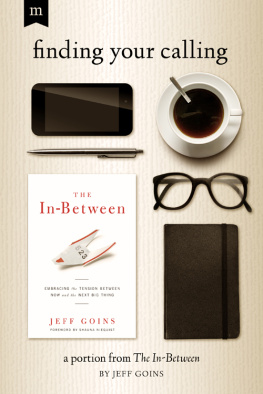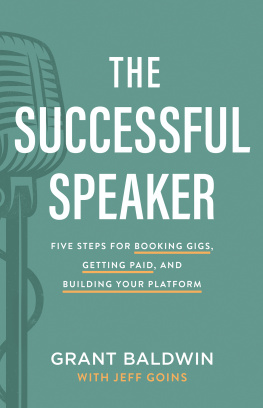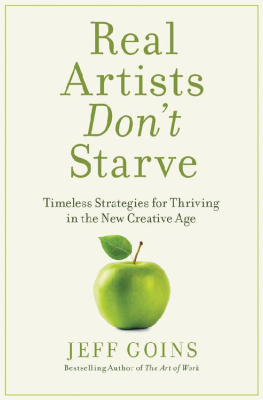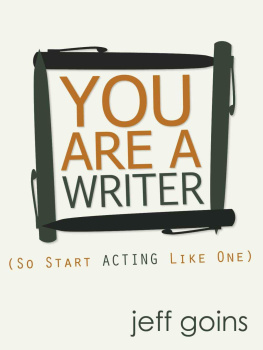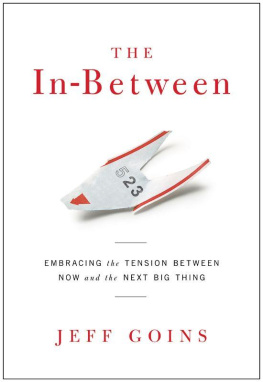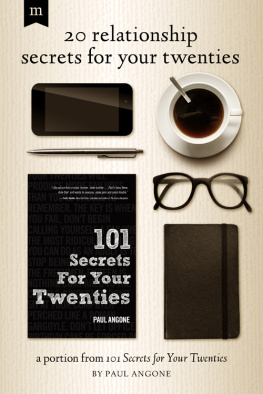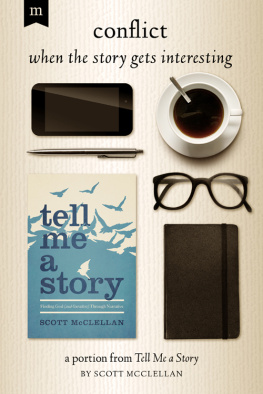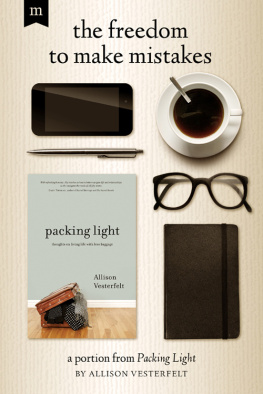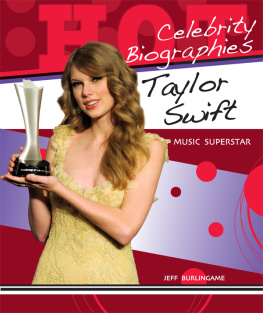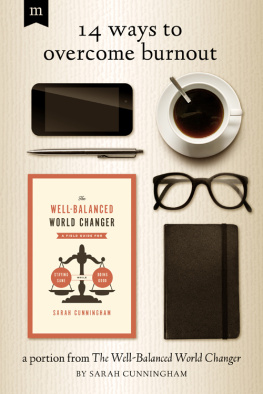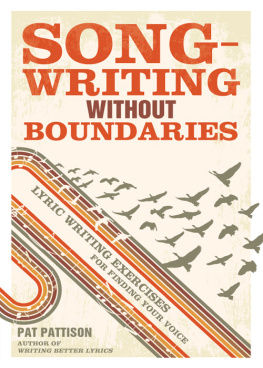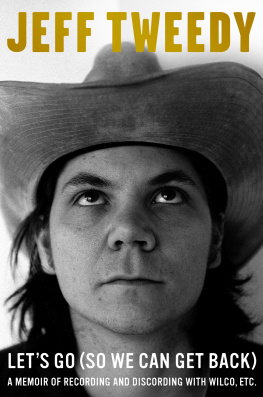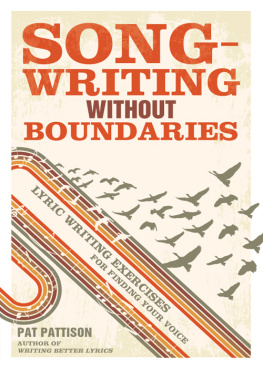The following content is taken from The In-Between, by Jeff Goins. If you own the full book already, you can find this section in chapter four.
If you are interested in hearing more from the team that facilitated this adapted content, visit moodycollective.com.
Martin Davidson and Arlene Davidson, Eddie and the Cruisers, directed by Martin Davidson (Los Angeles: Embassy Pictures, 1983).
Shauna Niequist, Cold Tangerines (Grand Rapids, MI: Zondervan, 2010).
.
.
2013 by
JEFF GOINS
All rights reserved. No part of this book may be reproduced in any form without permission in writing from the publisher, except in the case of brief quotations embodied in critical articles or reviews.
All Scripture quotations are taken from The Holy Bible, English Standard Version. Copyright 2000, 2001 by Crossway Bibles, a division of Good News Publishers. Used by permission. All rights reserved.
Published in association with the literary agency of Mark Oestreicher.
Edited by Bailey Utecht
Interior design: Design Corps
Cover design: Kara Davison / Faceout Studio
Cover image: Shutterstock #34362736
Illustrations by: Mandy Thompson
Author Photo: Ashley Goins
Library of Congress Cataloging-in-Publication Data
Goins, Jeff.
The in-between : embracing the tension between now and the next best thing / Jeff Goins.
pages cm
ISBN 978-0-8024-0724-5
1. Life--Religious aspectsChristianity. 2. Christian life. 3. ChangeReligious aspectsChristianity. 4. Expectation (Psychology)Religious aspectsChristianity. 5. Waiting (Philosophy) I. Title.
BV4501.3.G647 2013
248.4dc23
2013014296
We hope you enjoy this book from Moody Publishers. Our goal is to provide high-quality, thought-provoking books and products that connect truth to your real needs and challenges. For more information on other books and products written and produced from a biblical perspective, go to www.moodypublishers.com or write to:
Moody Publishers
820 N. LaSalle Boulevard
Chicago, IL 60610
1 3 5 7 9 10 8 6 4 2
Printed in the United States of America
This Portion Adapted From: The In-Between by Jeff Goins
Contents for The In-Between
Foreword
Introduction
LIFE BETWEEN the PANELS
part one
SLOW DOWN
CHAPTER 1: Siestas
SEARCHING for a BREAKTHROUGH
CHAPTER 2: Tracks
FINDING your WAY HOME
CHAPTER 3: The Road
LOVING the JOURNEY
part two
WORTH the WAIT
CHAPTER 4: Calling
FROM MUSIC to WORDS
CHAPTER 5: Courtship
LOVE takes TIME
CHAPTER 6: Expecting
THE PATH to PARENTHOOD
part three
WHEN the WAITING ENDS
CHAPTER 7: Bookshelves
WHERE old STORIES END
CHAPTER 8: Ice Cream
WHAT really MATTERS
Conclusion
Acknowledgments
Finding Your
Calling
S ometimes, all we need to do to find our calling is to look at what we love and see whats always been there. The journey of discovering my lifes work was not a process of dreaming but remembering.
I always thought I wanted to be a rock star. But the more I pursued music, the more I realized it wasnt right for me. My true vocation was hiding in the shadows, watching from afar like a distant love interest, always taken for granted.
Thats the funny thing about a calling. Like the girl next door, it can sneak up on you.
Some people wait their whole lives for the right career to come along, refusing to begin their lives until they have more clarity. Longing for a vocation that will complete them, they sometimes never find their lifes work. What Ive discovered is that the opposite is true: while we wait for our callings to present themselves, they are waiting on us to wake up to the signs.
In high school, my dad bought me a used electric guitar by trading in my neglected tenor saxophone for a cheap Fender Strato caster knock-off. It was blue and came with a black gig bag, and I thought it was the coolest thing in the world.
Thats when I decided to become a rock star.
In the early eighties, my dad played in a band called Majik. Back then, it was still cool to misspell common words and call it art. While I was growing up, he would regale me with stories of his time with the band, which included meeting Bob Dylan at a party and jamming with Neil Youngs buddies. He even dated one of the girls from the band Heart. My dada working-class Joe with a tattoo of a wizard on his armwas cool. A real rocker. And with him as my teacher, I was destined to be one, too.
After practicing playing guitar for six months without much improvement, I got frustrated. Able to limp through only a few simple songs, I wondered why I was no Carlos Santana. Did I just not have what it took? Angry, I took my complaint to my dad.
Snatching the guitar from my hands, he showed me how to play a barre chord by holding down all the strings with one finger. He told me I couldnt jump from one end of the guitar to the next, that I had to gradually work my way down the neck. And the same was true for playing solos. I had to practice.
Shortly after that, I started writing songs. I had always been a sucker for words, and with my music, my love for language had a new outlet.
Growing up, I watched the movie Eddie and the Cruisers with my dad more times than I can count. We saw it so many times on VHS that the tape slowed down and distorted the sound in certain places.
During one scene in the movie, Eddie, the lead singer, tells Frank, their lyricist: Words and music, man. They need each other.
As a new songwriter, I was beginning to discover how true that was.
Most nights in high school, I stayed up late, crafting poems that would someday have music behind them. Sophomore year, I found two guys who liked to jam, and together, we formed a band called Decaf. Determined to not be called copycats, my two new bandmates and I played almost all original music, which was rare for other bands we knew. We werent a cover band; we were a real band with real songs. And I was the songwriter. Finally, Id found my muse, a reason for living and creating. Or so I thought.
In college, I continued to play music. As I did, I became comfortable with writing songs. I joined a band that played music for our weekly chapel services, and we often formed side projects. On the weekends, we would travel, playing shows wherever anyone would have us. I was certain this was my destiny.
Around the same time, at the request of one of my professors, I started tutoring students at the Campus Writing Center. I wasnt an English major, but it was a way to make money using my familiarity with words. I certainly never thought itd lead anywhere.
After college, opportunities to pursue music continued, but my passion waned. I toured the country with a band, playing more shows than I ever would have imagined. Other than sleeping or eating, music was all I did. As a result, I became better than I ever thought possible. Realizing I could now be as good as I wantedit was really just a matter of practiceI was now faced with the dilemma of whether or not I wanted it. Playing gigs was no longer exciting, and I often felt distracted while playing guitar. Maybe it was the lull of life on the road, but I began to wonder if music really was my calling.
In between gigs, I started writing. Not having composed content longer than a song lyric, I decide to write a short story. The idea came while driving through the Midwest, surrounded by cornfields, with nothing to do but think. So I began.

